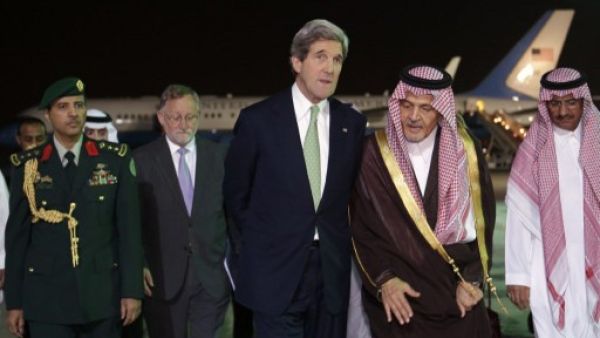U.S. Secretary of State John Kerry arrived in the Saudi capital on Sunday for talks with the Gulf monarchies on Iran and the deadly conflict roiling Syria.
Kerry, on his first trip to the region since taking over as the top US diplomat, was to dine with foreign ministers of the Gulf Cooperation Council, the group of six Gulf monarchies including Saudi Arabia.
On Monday he will hold separate talks with each GCC nation.
“We thank Kerry for America’s commitment with regard to the security of the region and we will share our concerns about the relationship with Iran and the developments in Syria,” Bahraini Foreign Minister Sheikh Khaled al-Khalifa said at a news conference after meeting with his five GCC counterparts.
Several oil-rich monarchies of the GCC, including Saudi Arabia and Qatar, have supported the rebellion inside Syria, while Iran has steadfastly backed President Bashar al-Assad’s regime.
Kerry arrived in Riyadh after a two-day visit to Cairo where he urged Egyptian political factions to bury their differences and unite in order to help revive the country’s sliding economy.
After Riyadh Kerry will head to Abu Dhabi on Monday and later to Qatar.
The six Gulf monarchies on Sunday criticized world inaction on Syria and Iranian “interference” in their internal affairs ahead of a visit to the Saudi capital by U.S. Secretary of State John Kerry.
“The Syrian crisis has become more of a quasi-catastrophe through the unjustified killing of the Syrian people,” Bahraini Foreign Minister Sheikh Khaled al-Khalifa said at the opening session of a Gulf Cooperation Council (GCC) meeting.
Sheikh Khaled criticized “the international community’s lack of serious and rapid action” towards resolving the two-year conflict which the United Nations estimates has cost more than 70,000 lives.
GCC members Saudi Arabia and Qatar have openly taken up the cause of the Syrian revolt and called for rebel forces to be armed in their battle against President Bashar al-Assad’s regime.
The GCC nations also slammed what they charged was Iranian interference in their internal affairs.
Saudi Arabia, Bahrain, Qatar, the United Arab Emirates, Kuwait, and Oman “look forward towards better relations with Iran, but unfortunately the latter continues to interfere in their internal affairs,” Sheikh Khaled said.
“It is important for our countries to stand united against such interference” from the Shiite Islamic republic across the Gulf, he said.
Relations between Iran and the GCC have plunged to a new low, with Tehran suspected of supporting Shiite opposition protests in Bahrain against the Sunni monarchy.
Tehran is also a staunch regional ally of Assad.
Yemen, the GCC states’ restive neighbor undergoing a difficult political transition, and the Saudi missile defense shield are also likely to be discussed, a diplomat said on condition of anonymity.

John Kerry is greeted by Saudi counterpart Prince Saud Al Faisal.








